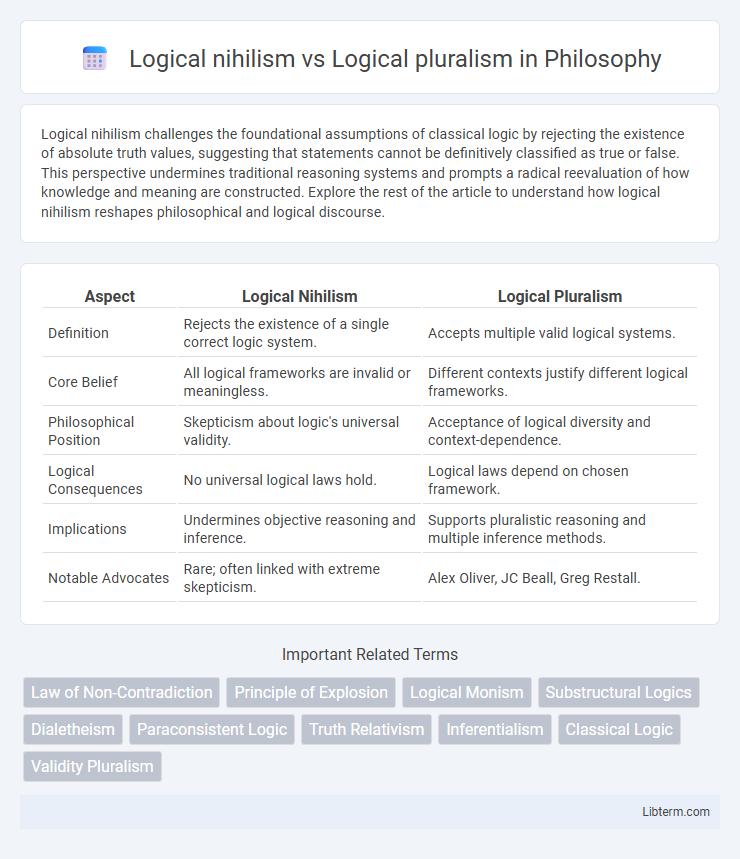Logical nihilism challenges the foundational assumptions of classical logic by rejecting the existence of absolute truth values, suggesting that statements cannot be definitively classified as true or false. This perspective undermines traditional reasoning systems and prompts a radical reevaluation of how knowledge and meaning are constructed. Explore the rest of the article to understand how logical nihilism reshapes philosophical and logical discourse.
Table of Comparison
| Aspect | Logical Nihilism | Logical Pluralism |
|---|---|---|
| Definition | Rejects the existence of a single correct logic system. | Accepts multiple valid logical systems. |
| Core Belief | All logical frameworks are invalid or meaningless. | Different contexts justify different logical frameworks. |
| Philosophical Position | Skepticism about logic's universal validity. | Acceptance of logical diversity and context-dependence. |
| Logical Consequences | No universal logical laws hold. | Logical laws depend on chosen framework. |
| Implications | Undermines objective reasoning and inference. | Supports pluralistic reasoning and multiple inference methods. |
| Notable Advocates | Rare; often linked with extreme skepticism. | Alex Oliver, JC Beall, Greg Restall. |
Introduction to Logical Nihilism and Logical Pluralism
Logical nihilism rejects the existence of any absolute logical truth or universal logical framework, arguing that no singular set of logical principles governs reasoning. Logical pluralism, in contrast, holds that multiple, equally valid logical systems coexist, each applicable under different contexts or reasoning practices. These contrasting views challenge the foundations of logic by either denying universal logical standards or embracing diverse logical frameworks.
Historical Background of Logical Theories
Logical nihilism, emerging in the late 20th century, challenges the existence of a single true logic, arguing that no logical system can claim absolute correctness. Contrarily, logical pluralism traces its roots to early 20th-century thinkers like Rudolf Carnap and further developed by philosophers such as JC Beall and Greg Restall, endorsing multiple coexisting logics as valid frameworks depending on different contexts or applications. These contrasting perspectives reflect an ongoing philosophical debate about the nature and universality of logical laws since the foundational shifts initiated by Frege, Russell, and Godel.
Defining Logical Nihilism
Logical nihilism rejects the existence of any universal valid logic, asserting that no logical system holds absolute authority across all contexts. It challenges the idea that logical laws are inherently binding or necessary, denying the objective validity of logical principles. This contrasts with logical pluralism, which accepts multiple coexisting logical systems as equally legitimate depending on differing frameworks or purposes.
Defining Logical Pluralism
Logical pluralism asserts that multiple, distinct logical systems can be valid simultaneously, allowing for different valid consequence relations depending on context or purpose. It contrasts with logical nihilism, which denies the existence of any universally valid logical principles or systems. Defining logical pluralism involves recognizing that logic is not monolithic but rather a diverse field accommodating various inference frameworks.
Key Differences: Nihilism vs Pluralism in Logic
Logical nihilism rejects the existence of any correct or objective logical system, asserting that no logical principles can be universally valid. Logical pluralism, in contrast, maintains that multiple, equally legitimate logical systems coexist, each applicable under different contexts or frameworks. The key difference lies in nihilism's denial of objective logic altogether, while pluralism embraces diversity in logical reasoning without privileging a singular standard.
Philosophical Implications of Logical Nihilism
Logical nihilism challenges the very existence of any correct logic systems, asserting that no logical principles are universally valid or reliable, which fundamentally questions the foundation of rational discourse and knowledge claims. This skepticism undermines traditional philosophical commitments to objective truth and consistent reasoning, leading to a radical re-evaluation of epistemology and metaphysics. The philosophical implications of logical nihilism provoke intense debates about the limits of human cognition, the nature of logical necessity, and whether any form of reasoning can be absolutely justified.
Philosophical Implications of Logical Pluralism
Logical pluralism asserts multiple correct logics can coexist, challenging the classical notion that a single logical system governs valid reasoning. This perspective emphasizes the fluidity of truth values and inferential relations, reshaping foundational views on rationality, meaning, and contradiction within philosophy. Embracing logical pluralism encourages reconsideration of epistemological and metaphysical assumptions, promoting a more inclusive approach to diverse logical frameworks.
Criticisms and Challenges
Logical nihilism faces criticism for its radical dismissal of established logical principles, leading to difficulties in maintaining coherent communication and reasoning frameworks. Logical pluralism encounters challenges regarding the justification for endorsing multiple, sometimes conflicting, logical systems, raising concerns about relativism and the coherence of truth across different logical frameworks. Both positions struggle with practical applicability and face skepticism over their implications for consistency and objectivity in logic.
Practical Applications in Contemporary Logic
Logical nihilism denies the existence of any true logical principles, challenging the foundation of traditional reasoning systems, thus complicating the development of consistent computational algorithms and formal verification methods. Logical pluralism accepts multiple legitimate logical systems, enabling flexibility in artificial intelligence, knowledge representation, and automated theorem proving by tailoring inference rules to specific contexts. Contemporary logic applications leverage pluralistic frameworks to enhance problem-solving in complex domains, whereas nihilism prompts critical examination of logic's validity, influencing philosophical and foundational studies.
Conclusion: The Future of Logic Debates
Logical nihilism rejects the existence of any universal logical truths, arguing that all logical systems are fundamentally flawed or arbitrary, whereas logical pluralism accepts multiple coexisting logics as valid depending on the context or problem domain. The future of logic debates will likely see increased exploration of context-sensitive frameworks, where pluralism guides the application and development of logics tailored to specific disciplines like quantum computing or linguistic analysis. This shift emphasizes a pragmatic approach to logic, balancing the rejection of absolute logical authority with the acceptance of diverse, sometimes conflicting, logical systems.
Logical nihilism Infographic

 libterm.com
libterm.com